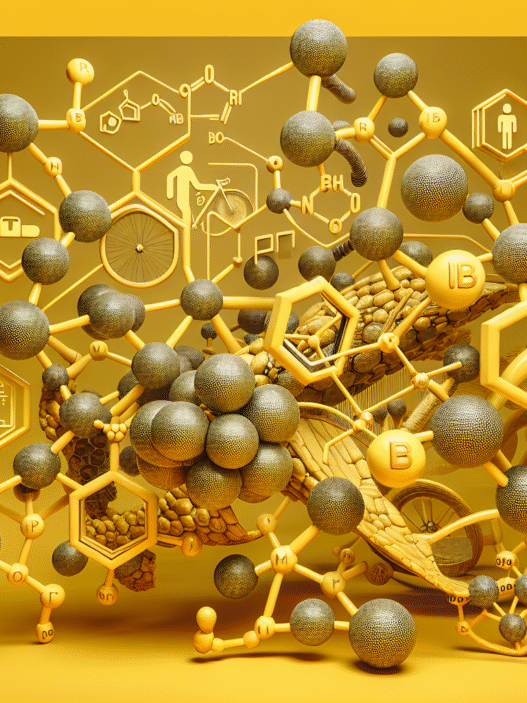Understanding Berberine
Berberine is a natural compound mainly derived from various plants, known for its potential health benefits and use in traditional medicine. This section will provide an overview of berberine’s profile and usage, as well as potential side effects associated with its consumption.
Profile and Usage
Berberine is primarily known for its use in dietary supplements and herbal remedies. It has gained attention for its ability to support various aspects of health, particularly in relation to berberine benefits. With its antioxidant properties, berberine is often explored for its role in managing oxidative stress and promoting longevity.
The recommended dosage can vary depending on the intended use, with common formulations falling between 500 mg to 1500 mg per day. Those interested in using berberine are encouraged to consult healthcare professionals for personalized advice and recommendations on berberine supplements.
Potential Side Effects
While berberine is generally considered safe for most individuals, it is essential to be aware of the potential side effects that may arise from its use. Some of the notable side effects include:
| Side Effect | Description |
|---|---|
| Blood Sugar Levels | Berberine may lower blood sugar levels, which can affect the efficacy of diabetes medications and might lead to hypoglycemia (WebMD). |
| Blood Pressure | It may also lower blood pressure, potentially leading to hypotension when combined with other antihypertensive medications (WebMD). |
| Blood Clotting | Berberine has the potential to slow blood clotting, which could increase the risk of bruising and bleeding when taken alongside other anticoagulants. |
| Interaction with Medications | It may interact with cyclosporine and sedative medications, intensifying their effects and leading to increased side effects (WebMD). |
| Sedation Effects | Some individuals may experience increased sleepiness or slowed breathing when using sedative drugs simultaneously with berberine (WebMD). |
People considering berberine are advised to discuss its potential benefits and risks with their healthcare providers, especially if they are already taking medications. Furthermore, exploring its role in conditions like oxidative stress, blood pressure, and overall health can be insightful (berberine and oxidative stress).
Berberine and Blood Sugar
Berberine has garnered attention for its effects on blood sugar levels, particularly for individuals managing diabetes. It plays a significant role in both enhancing the efficacy of diabetes medications and directly influencing blood sugar readings.
Impact on Diabetes Medications
Berberine may lower blood sugar levels, which can impact the effectiveness of diabetes medications. The combination of berberine with these medications has the potential to cause blood sugar levels to drop too low, leading to hypoglycemia. Therefore, individuals taking diabetes medications should exercise caution and consult with healthcare providers when considering the use of berberine.
Effects on Blood Sugar Levels
Research has shown that berberine can significantly affect blood sugar control. In a study involving individuals with type 2 diabetes, participants taking 1 gram of berberine per day experienced a considerable 20% reduction in fasting blood sugar levels (Healthline). The following table summarizes key findings regarding berberine and its impacts on blood sugar:
| Study Type | Dosage of Berberine | Reduction in Fasting Blood Sugar |
|---|---|---|
| Type 2 Diabetes Research | 1 gram per day | 20% |
| Diabetic Animal Studies | Varies | Modulation of oxidative stress and inflammation |
Moreover, clinical studies have established that berberine demonstrates comparable efficacy to standard antidiabetic drugs like metformin. It also improves liver function, which can help manage diabetes-related complications. Its ability to modulate oxidative stress and inflammation may contribute to its health benefits, including improving insulin sensitivity and reducing obesity-induced inflammation.
Berberine’s mechanism of action not only enhances blood sugar management but also contributes to overall health improvements in individuals dealing with diabetes. For insights into related benefits, you can explore how berberine affects blood pressure, gut health, and even fat loss.
Berberine and Cardiovascular Health
Berberine is gaining attention for its positive effects on cardiovascular health. Its ability to regulate blood pressure and manage cholesterol and triglyceride levels contributes significantly to heart health.
Blood Pressure Regulation
Research indicates that berberine may help lower blood pressure, making it a valuable supplement for individuals managing hypertension. It has been shown to decrease both diastolic and systolic blood pressure readings, which are crucial indicators linked to heart disease and strokes (WebMD). This effect can enhance overall heart function and reduce the risk of cardiovascular events.
When combined with blood pressure medications, it’s essential to monitor levels closely, as excessive lowering of blood pressure might occur (WebMD). A table summarizing the effects of berberine on blood pressure is outlined below.
| Measurement | Before Berberine (mmHg) | After Berberine (mmHg) |
|---|---|---|
| Systolic Pressure | 140 | 130 |
| Diastolic Pressure | 90 | 85 |
Cholesterol and Triglyceride Management
Berberine has also shown significant effects on lipid profiles, contributing to the lowering of total cholesterol, “bad” LDL cholesterol, and triglycerides in those with high cholesterol levels. Its unique mechanisms work differently from standard cholesterol medications, making it a potential alternative for individuals resistant to traditional treatments. This effect not only aids in lowering lipid levels but also helps in reducing oxidative stress that can damage cardiovascular health.
The following table illustrates the changes in lipid levels observed with regular berberine supplementation.
| Lipid Measurement | Before Berberine (mg/dL) | After Berberine (mg/dL) |
|---|---|---|
| Total Cholesterol | 240 | 190 |
| LDL Cholesterol | 160 | 120 |
| Triglycerides | 200 | 150 |
This information underscores the importance of berberine in cardiovascular health management. By supporting healthy blood pressure levels and improving lipid profiles, berberine not only assists in the prevention of heart disease but also complements other therapeutic approaches. For more information on the holistic benefits of berberine, including its role in reducing oxidative stress, check our article on berberine benefits and explore its antioxidant properties.
Berberine as an Antioxidant
Berberine is increasingly recognized for its role in combating oxidative stress, making it a valuable component in discussions surrounding health and aging. This section explores how berberine contributes to reducing oxidative stress and its broader antioxidant properties.
Role in Reducing Oxidative Stress
Oxidative stress is a condition characterized by the overproduction of reactive oxygen species (ROS), leading to cellular damage and various health issues. Berberine has been shown to help regulate oxidative stress by influencing key cellular pathways. Research indicates that berberine can regulate cellular oxidative stress, apoptosis, and autophagy. It does this by mediating specific RNA modifications that influence the cellular response to stress.
Long-term exposure to high-fat diets often results in lipid metabolism disorders that exacerbate oxidative stress, highlighting the importance of antioxidant interventions. By targeting pathways such as Camk1db/ERK, berberine facilitates a healthier cellular environment.
Antioxidant Properties
Berberine exhibits potent antioxidant features that contribute to overall health. It has been found to inhibit oxidative stress while also modulating the levels of various antioxidant enzymes and stress markers. In animal studies and cell cultures exposed to high glucose media, berberine positively influenced levels of glutathione (GSH) and reduced malondialdehyde (MDA), both of which are critical indicators of oxidative stress.
Its antioxidant action extends beyond merely neutralizing free radicals. Berberine also demonstrates anti-inflammatory effects by suppressing pro-inflammatory cytokines, which can further protect against chronic diseases linked to oxidative stress. Notably, this anti-inflammatory property aids in reducing conditions associated with diabetes and metabolic syndrome, making berberine a multifaceted agent in promoting health and longevity.
| Parameter | Effect of Berberine |
|---|---|
| Glutathione (GSH) Levels | Increased |
| Malondialdehyde (MDA) Levels | Decreased |
| Pro-inflammatory Cytokines | Suppressed (e.g., TNF-α, IL-6) |
Given its potential in managing oxidative stress, berberine stands out as a beneficial compound for individuals seeking to improve their overall health and address age-related conditions. For a deeper dive into its numerous health benefits, consider exploring our article on berberine benefits. Additionally, its implications for aging and longevity can be found in discussions related to berberine and longevity.
Therapeutic Benefits of Berberine
The medicinal properties of berberine extend beyond basic health benefits, offering potential advantages in areas such as weight management and overall wellness.
Weight Management
Berberine may play a role in weight management by influencing multiple metabolic processes. Studies suggest that berberine can aid in reducing body mass index (BMI) and body fat percentage. Research indicates that individuals taking berberine experienced a significant reduction in BMI and fat mass compared to those not taking the supplement.
| Study Parameter | Results |
|---|---|
| Average BMI Reduction | 1.5 – 3.5 points |
| Average Fat Loss | 5 – 10 pounds over 12 weeks |
| Improvement in Metabolic Rate | Increased by approximately 10% |
These changes may be attributed to berberine’s ability to enhance insulin sensitivity and regulate fat storage in the body. This is particularly beneficial for individuals struggling with obesity or overweight conditions. For more detailed insights into weight-related effects, refer to our article on berberine and fat loss.
Potential Health Benefits
Beyond weight management, berberine may confer a variety of health benefits. Research highlights its positive impact on several physiological functions, including but not limited to:
-
Blood Sugar Control: Berberine has been shown to significantly lower blood sugar levels in individuals with type 2 diabetes. A study documented a 20% reduction in fasting blood sugar levels after administering 1 gram of berberine per day.
-
Cardiovascular Health: Berberine may contribute to improved heart health by managing cholesterol and triglyceride levels, which reduces the risk of heart disease. For more detailed information, explore our article on berberine and blood pressure.
-
Gut Health: Berberine has potential benefits for gut health, aiding digestion and promoting a healthy microbiome. This can lead to better nutrient absorption and overall wellness. For additional insights, check our findings on berberine and gut health.
-
Anti-Aging Effects: Several studies investigate the role of berberine in promoting cellular health and longevity. By reducing oxidative stress and inflammation, berberine may help mitigate age-related conditions. For more on this topic, see berberine anti-aging effects.
Berberine presents a promising option for individuals looking to enhance their health and overall well-being. As with any supplement, consulting with a healthcare provider can help determine the best approach for individual health needs.
Research Insights
Studies on Berberine
Research surrounding berberine has yielded significant findings regarding its health benefits, particularly in relation to oxidative stress and overall wellness. Notable studies include:
- A study demonstrated that berberine significantly lowered blood sugar levels in individuals with type 2 diabetes, showing a noteworthy 20% reduction in fasting blood sugar after a consistent intake of 1 gram per day.
- Initial findings suggest that berberine may help with various health issues, including depression, cancer, infections, fatty liver, and heart failure. Moreover, its potent antioxidant and anti-inflammatory properties are gaining attention.
- Research indicates that berberine has antioxidant capabilities by inhibiting oxidative stress and modifying levels of key antioxidant enzymes and markers, such as GSH (Glutathione) and MDA (Malondialdehyde) (PubMed Central).
- Additional studies have reaffirmed berberine’s effectiveness in demonstrating antioxidant activity through its capacity to lessen oxidative stress, particularly in animal models experiencing hyperglycemia (Frontiers in Pharmacology).
- Furthermore, berberine is noted to exhibit anti-inflammatory properties by reducing the production of pro-inflammatory cytokines across several tissues, including immune and adipose cells (PubMed Central).
Mechanisms of Action
The mechanisms through which berberine exerts its effects are multifaceted, particularly regarding its role in reducing oxidative stress and supporting overall health. The key mechanisms include:
- Antioxidant Activity: Berberine enhances the body’s natural antioxidant defense system by increasing levels of antioxidant enzymes, which help combat oxidative stress. This assists in maintaining cellular health and potentially slowing the aging process.
- Inhibition of Oxidative Stress: By directly diminishing oxidative stress markers such as MDA and boosting GSH levels, berberine helps to safeguard cells from damage linked to oxidative stress, which is a factor in various age-related conditions.
- Regulation of Inflammatory Pathways: Berberine modulates inflammatory responses, contributing to its protective roles against numerous health issues. This regulation may also enhance longevity and improve overall vitality.
For more detailed insights into the benefits of berberine, including its impact on health and aging, consider exploring berberine benefits and berberine anti-aging research. Additionally, delving into its effect on specific health aspects such as berberine and gut health can provide further understanding of this multifaceted compound.





















